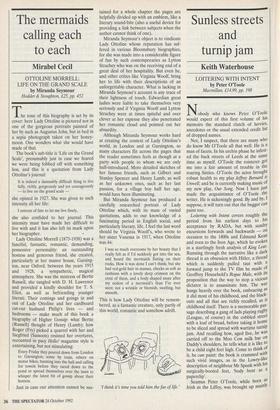The mermaids calling each to each
Mirabel Cecil
OTTOLINE MORRELL: LIFE ON THE GRAND SCALE by Miranda Seymour Hodder & Stoughton, L'25, pp. 452 The tone of this biography is set by its cover: here Lady Ottoline is pictured not in one of the gorgeous portraits painted of her by such as Augustus John, but in bed in a sepia photograph taken on her honey- moon. One wonders what she would have made of that.
The book's sub-title is 'Life on the Grand Scale', presumably just in case we feared we were being fobbed off with something less, and this is a quotation from Lady Ottoline's journal:
It is indeed a damnably difficult thing to live fully, richly, gorgeously and yet courageously — to live on the grand scale —
she opined in 1927. She was given to such intensity all her life:
I entreat of fate to let me live finely,
she also confided to her journal. This intensity must have made her difficult to live with and it has also left its mark upon her biographer.
Lady Ottoline Morrell (1873-1938) was a fanciful, fantastic, romantic, demanding, possessive personality: an outstanding hostess and generous friend, she created, particularly at her manor house, Garsing- ton, near Oxford, between the years 1915 and 1928, a sympathetic, magical atmosphere. She was the mistress of Bertie Russell, she tangled with D. H. Lawrence and provided a kindly shoulder for T. S. Eliot, as well as befriending younger literati. Their comings and goings in and out of Lady Ottoline and her cardboard cut-out husband Philip's lives — and bedrooms — make much of this book a biography of Higher Gossip: what Bertie (Russell) thought of Henry (Lamb); how Roger (Fry) picked a quarrel with her and Siegfried (Sassoon) resisted her overtures, recounted in pacy Hello! magazine style is entertaining, but not stimulating:
Every Friday they poured down from London to Garsington, some by train, others on motor bikes, bursting into the hall and calling for towels before they raced down to the pond or spread themselves over the lawn to whisper the latest bit of gossip about their hostess.
Just in case our attention cannot be sus- tamed for a whole chapter the pages are helpfully divided up with an emblem, like a literary sound-bite (also a useful device for providing a link between subjects when the author cannot think of one).
Miranda Seymour's object is to vindicate Lady Ottoline whose reputation has suf- fered in various Bloomsbury biographies, for she was made into a considerable figure of fun by such contemporaries as Lytton Strachey who was on the receiving end of a great deal of her hospitality. But even he, and other critics like Virginia Woolf, bring her to life with their descriptions of an unforgettable character. What is lacking in Miranda Seymour's account is any trace of their lightness of touch. Edwardian great ladies were liable to take themselves very seriously and if Virginia Woolf and Lytton Strachey were at times spiteful and over clever at her expense they also penetrated her romantic cloud and pointed out her absurdity.
Although Miranda Seymour works hard at creating the context of Lady Ottoline's world, in London and at Garsington, so many characters flit across the pages that the reader sometimes feels as though at a party with people to whom we are only half-introduced. More detailed sketches of her famous friends, such as Gilbert and Stanley Spencer and Henry Lamb, as well as her unknown ones, such as her last passion, for a village boy half her age, would have been illuminating.
But Miranda Seymour has produced a carefully researched portrait of Lady Ottoline which, with its mass of varied quotations, adds to our knowledge of a fascinating period in English social, and particularly literary, life. I feel the last word should be Virginia Woolf s, who wrote to her sister Vanessa in 1917, when Ottoline was 44:
I was so much overcome by her beauty that I really felt as if I'd suddenly got into the sea, and heard the mermaids fluting on their rocks. How it was done I can't think; but she had red-gold hair in masses, cheeks as soft as cushions with a lovely deep crimson on the crest of them, and a body shaped more after my notion of a mermaid's than I've ever seen; not a wrinkle or blemish, swelling, but smooth.
This is how Lady Ottoline will be remem- bered, as a fantastic creature, only partly of this world, romantic and somehow adrift.
'I think it's time you told him the fax of life.'


































































 Previous page
Previous page